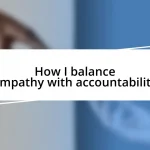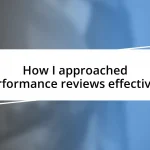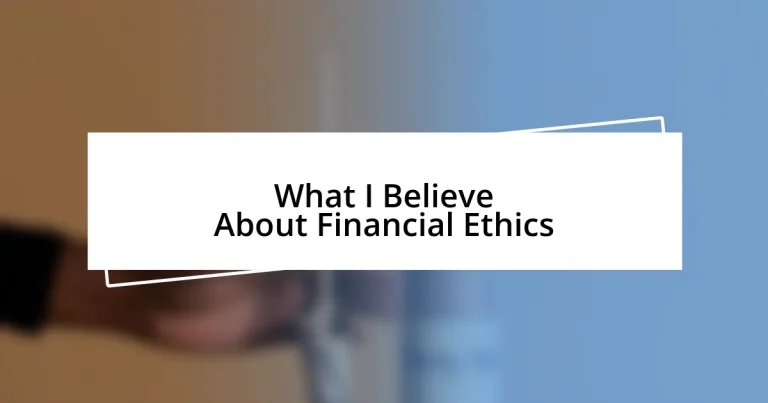Key takeaways:
- Financial ethics are grounded in honesty, integrity, and accountability, forming the foundation of trust in financial transactions.
- Ethics in finance enhance decision-making, build client relationships, and protect reputations; neglecting them can lead to severe consequences.
- Challenges include pressure to meet sales targets and miscommunication about financial products, highlighting the need for clarity and open dialogue.
- Strategies for ethical decision-making involve reflecting on personal values, fostering team discussions, and seeking mentorship for guidance.
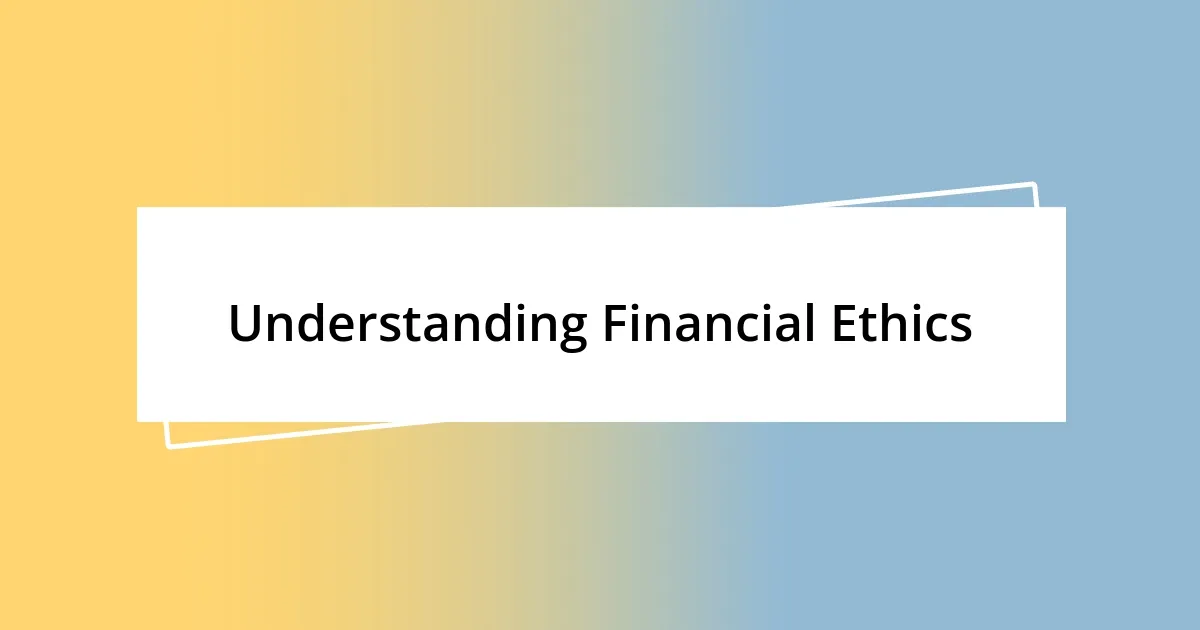
Understanding Financial Ethics
Understanding financial ethics is about navigating the moral principles that guide our decisions in the financial world. For me, it’s not just a set of rules; it’s the foundation of trust in our transactions. Have you ever noticed how a lapse in ethics can lead to industry-wide distrust? I remember a time in my career when a colleague faced allegations of misconduct, and it created a ripple effect that left everyone feeling uneasy.
At its core, financial ethics involves honesty, integrity, and accountability. In my experience, when you prioritize ethical practices, it fosters a culture of transparency that benefits everyone involved. Have you felt the relief that comes from knowing you’re doing the right thing, especially when the pressure is on? I certainly have, and it’s that clarity that pushes me to uphold these principles despite any challenges.
The complexities of financial decisions often raise questions about fairness and responsibility. I often find myself pondering, how do we balance profit with ethical obligations? Reflecting on past experiences, I realize that the toughest choices often reveal our true values. It’s a constant reminder that understanding financial ethics is about more than just compliance; it’s about cultivating a sense of purpose in what we do.
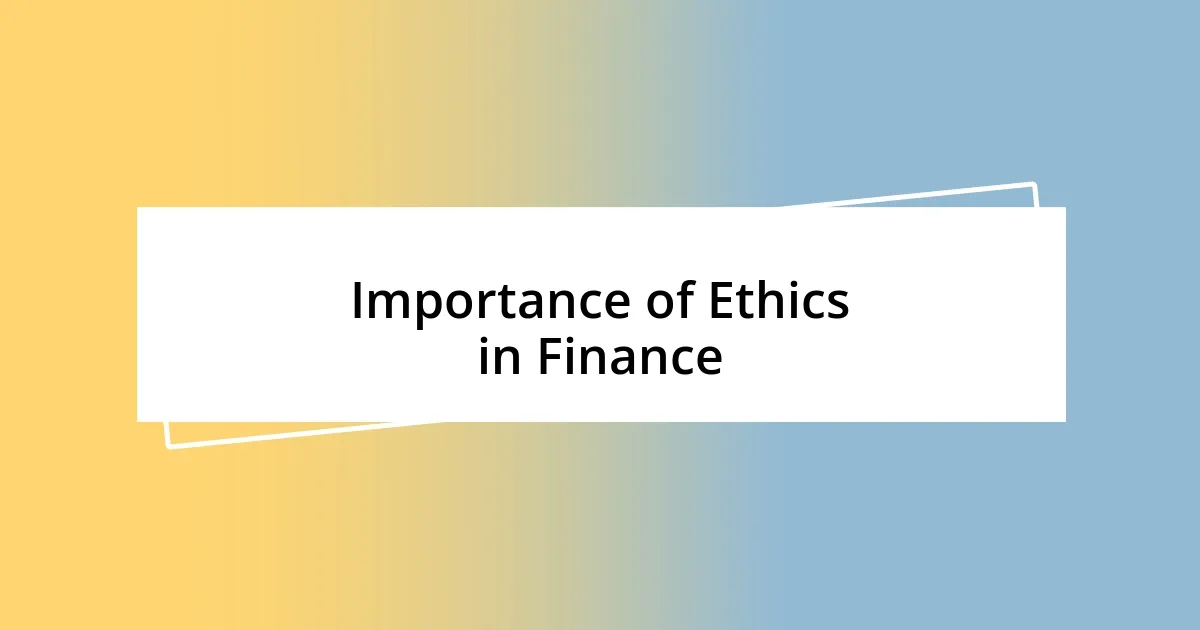
Importance of Ethics in Finance
Ethics in finance serves as the bedrock of a stable economic environment. I remember when I was part of a project that required intense financial scrutiny. Everyone involved approached the situation with integrity, which not only helped us avoid potential pitfalls but also strengthened our collective resolve. It was a clear reminder of how ethical practices can lead to enhanced decision-making and promote confidence among stakeholders. Have you ever felt that boost in morale when you know you’re part of something that values ethical behavior?
Moreover, ethical finance is crucial in building lasting relationships with clients and customers. When I first started my career, I was taught to prioritize transparency. One day, a client asked tough questions about hidden fees. Instead of dodging or sugarcoating answers, I embraced the moment and explained our policies openly. That honesty turned an awkward conversation into a solid trust-building opportunity. Isn’t it fascinating how clear communication rooted in ethics can change perceptions?
Lastly, neglecting ethics can result in severe consequences, both for individuals and institutions. I recall a case where a financial firm faced a major scandal due to unethical practices. The fallout was devastating, with not just financial losses, but reputational damage that took years to mend. It struck me deeply how a single ethical lapse can spiral out of control. Isn’t it essential that we uphold our principles to safeguard not only our careers but also the industry’s integrity?
| Ethical Importance | Consequences of Neglect |
|---|---|
| Builds trust and credibility | Loss of reputation |
| Enhances decision-making | Legal repercussions |
| Strengthens relationships | Financial losses |
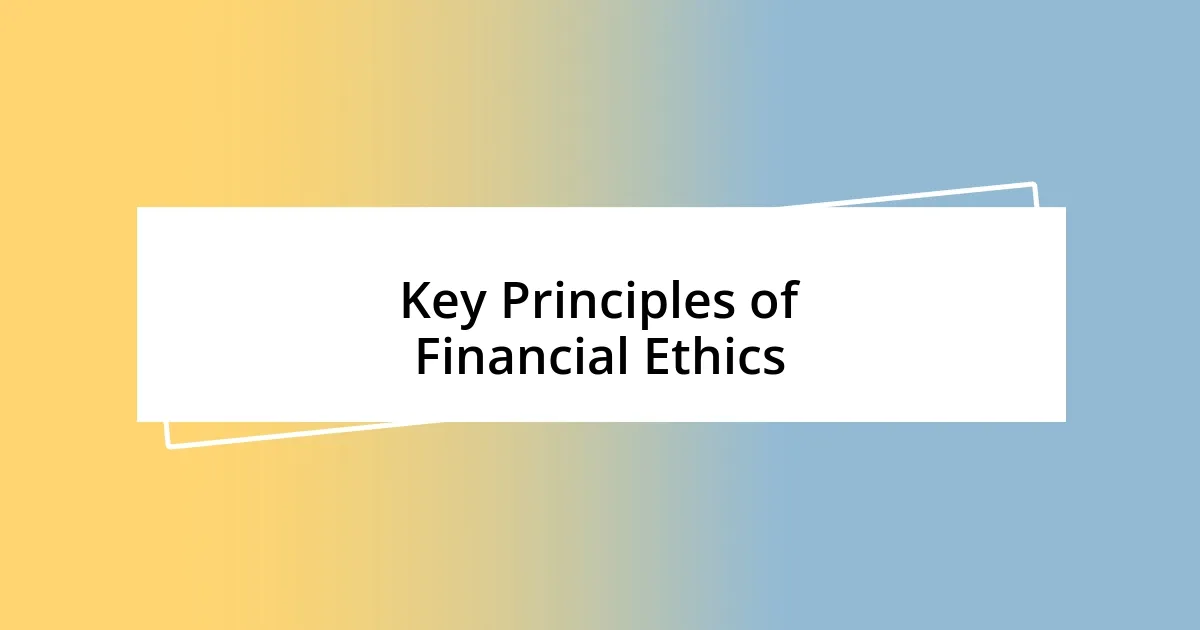
Key Principles of Financial Ethics
Financial ethics are anchored in several key principles that guide our actions in the financial landscape. I genuinely believe that integrity is the cornerstone, reminding us that how we conduct ourselves directly impacts not only our reputation but also the trust that clients place in us. I still vividly remember a time early in my career when I was advising a friend on his investment choices. I chose to be brutally honest about the risks, even though it could have cost me a sale. In the end, that honesty strengthened our friendship and enriched my reputation among his network.
Here are some key principles to consider:
- Honesty: Being truthful in all communications, avoiding deceit and manipulation.
- Transparency: Openly sharing information, especially about fees and potential conflicts of interest.
- Accountability: Taking responsibility for our actions, both in success and in failure.
- Fairness: Treating all stakeholders equitably and justly in all financial dealings.
- Confidentiality: Ensuring that sensitive information is protected and only shared with authorized parties.
Each of these principles resonates with me because they continuously remind us that financial decisions are never made in isolation; they affect real people and communities. I can recall an instance where a colleague faced an ethical dilemma with a major client who wanted to hide certain financial details. Instead of going along, my colleague took a stand, leading to an eventual fallout with the client but earning respect from our peers. That commitment to ethical standards, I believe, is what defines the essence of our profession.
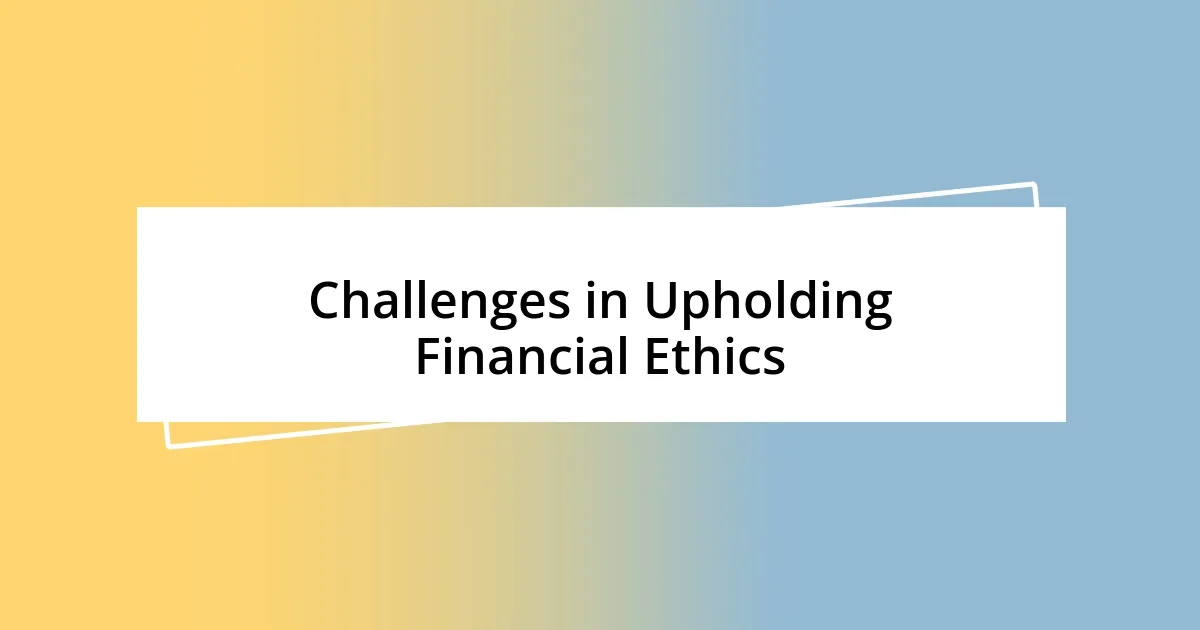
Challenges in Upholding Financial Ethics
Upholding financial ethics can often feel like navigating a minefield. One challenge I’ve encountered is the pressure to meet aggressive sales targets that sometimes overshadow ethical considerations. I remember a time in a meeting when a manager pushed the team to enhance our sales figures, even suggesting strategies that felt slightly dishonest. It was a tense moment—should I speak up and risk my standing in the team, or stay silent? I chose to voice my concerns, realizing that maintaining my values was far more important than any temporary success.
Another significant challenge lies in the complexities of financial products themselves. I’ve often found myself in situations where clients didn’t fully understand the financial instruments we offered. One time, I had to explain a particularly intricate investment option to an eager investor. I could see the confusion wash over her face as I dove into jargon. This experience highlighted for me the necessity of not only adhering to ethical standards but also ensuring clarity and comprehension in communication—it’s a responsibility I take seriously. How do we ensure our clients feel informed and empowered rather than overwhelmed?
Lastly, the competitive nature of the financial industry can lead individuals to rationalize unethical behaviors, thinking they’re merely “playing the game.” In one memorable instance, I saw a colleague bend the truth in a client proposal, justifying it as a necessary move to secure the account. Witnessing that moment made my heart sink; I realized that every small compromise chips away at the integrity of our industry. This misalignment between personal ethics and workplace culture begs the question: how can we establish a financial environment that prioritizes ethics over wins? It’s a conversation we must continue having.
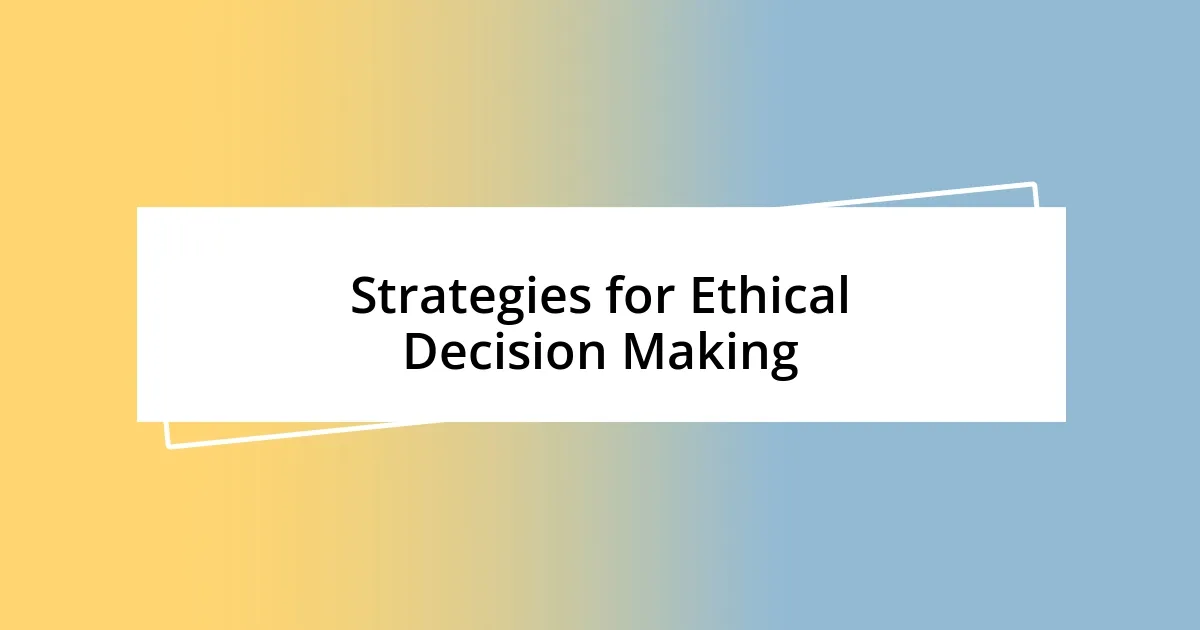
Strategies for Ethical Decision Making
When faced with ethical dilemmas, taking a moment to reflect on personal values can be a powerful strategy for decision-making. I remember a time when a client pressured me for a recommendation that didn’t sit well with me. Instead of rushing to meet their demands, I paused to consider how my choice would affect not just the client but my reputation in the long run. That moment of reflection allowed me to provide honest advice instead, and to my surprise, the client appreciated the transparency.
Another effective strategy is to foster a culture of open dialogue within your team. I recall how our team implemented regular ethical brainstorming sessions. These discussions became a safe space to voice concerns about tricky scenarios without fear of judgment. I still visualize sitting around that table, sharing experiences, and realizing that we all wrestle with similar dilemmas. It’s incredibly empowering to know that you’re not alone in these situations.
Finally, I believe in proactively seeking advice from mentors when navigating uncharted waters. In one instance, I faced a challenging decision where the implications felt overwhelming. Reaching out to a trusted mentor provided new perspectives I hadn’t considered, and their wisdom illuminated the path forward. There’s a saying, “Two heads are better than one,” and in my experience, that couldn’t be more true. How often do we overlook the potential insights others can share? It’s a reminder that collaboration can strengthen our ethical compass in finance.
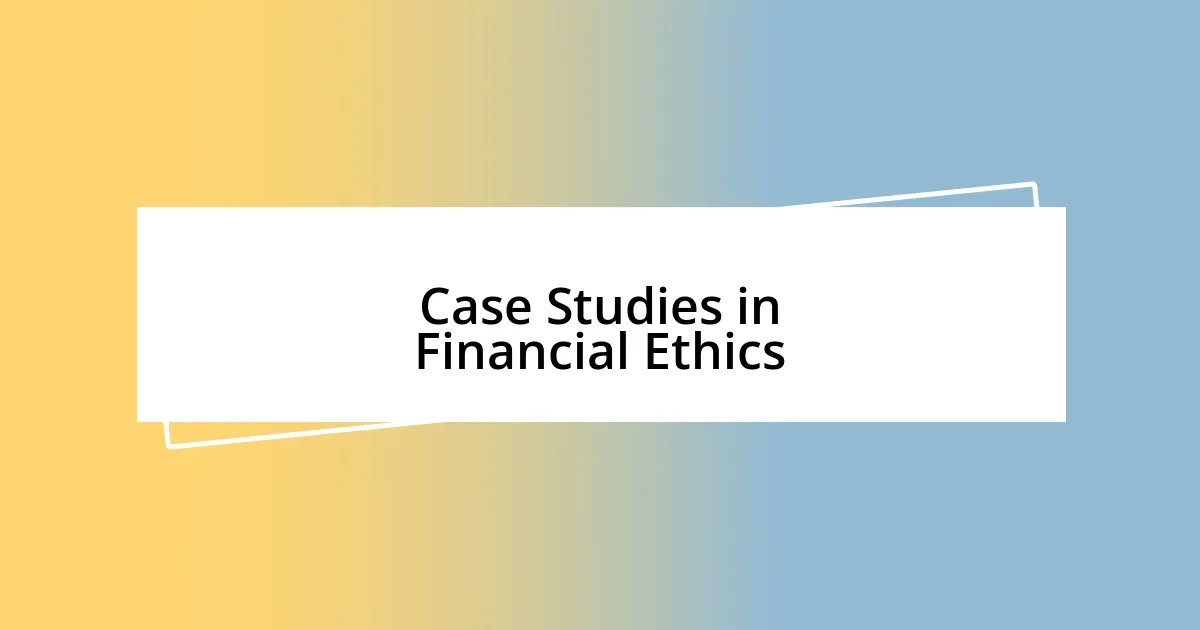
Case Studies in Financial Ethics
One case study that really struck me involved a financial advisory firm that faced backlash when a high-profile scandal erupted. A trusted advisor had been manipulating client information to secure loans that benefitted the firm—an action that ultimately destroyed their credibility. I still remember the conversations that followed this incident in our industry forums; it served as a vivid reminder of the delicate balance between ambition and ethics. How could such a breach of trust happen in a sector built on relationships? It’s a question that lingered long after the headlines faded.
In another instance, I observed a smaller firm that turned the situation around by openly discussing past mistakes during their team meetings. Rather than shying away from failures, they used them as learning tools. I recall a particularly brave moment when an analyst shared how a rushed recommendation had badly misled a client. Instead of shame, there was revelation and a renewed commitment to transparency. This culture of honesty provided insight into how mistakes can fuel ethical growth. It made me wonder: what if every firm took this route? Could we create a ripple effect of integrity in our industry?
A more personal example relates to a time when I witnessed a colleague facing ethical pressure from a client who was adamant about investing in a dubious scheme. There was palpable tension in the air as the temptation of commissions loomed. I admired his decision to refuse, stating that aligning with the client’s short-term desires didn’t justify compromising long-term ethics. It was a gripping moment that underscored a crucial truth: sometimes, standing firm in one’s principles, even in the face of potential loss, speaks louder than any financial incentive. Can we truly respect an industry where ethics take a back seat to profits? It’s a vital dialogue we should continue exploring together.

